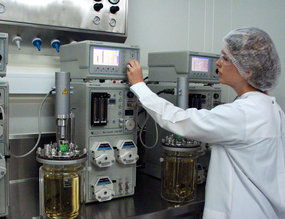Scientist confident of cancer treatment breakthrough
20 May 2008, by in HAIR LOSS SCIENCEA researcher holds high hopes for cancer treatments without side-effects in the next decade. (AAP: Vera Devai, file photo)
The treatment of cancer can be a harrowing, painful and dispiriting process.
But a leading Australian researcher predicts that chemotherapy side-effects such as nausea and hair loss will become a thing of the past as scientists gain a greater understanding of the biology of cancer.
Associate Professor Nick Saunders from the Diamantina Institute at the University of Queensland says a breakthrough in the treatment of cancer is probably only a decade away.
“In the past decade we’ve made enormous advances I would say. Most of that has come from advances on the molecular sciences, mainly to do with genetic technology and computational biology,” he said.
“These advances have allowed us to identify specific defects within particular cancers.
“Ultimately these have provided information about drug targets. And so I think, at the moment, the tide is changing in our treatment of cancers.
“I think cancer’s become a disease that is considered treatable, but is also going to be associated with far less side-effects then we have traditionally associated with cancer therapies.”
He says the key to prescribing cancer medication free of side-effects, such as hair-loss and vomiting, is to pinpoint the defects of the disease.
“If you’re … presenting to your doctor and you’ve got hyper-tension for example, then we give you drugs which you take when you go home and they get your high blood pressure back in control,” he said.
“Your hair doesn’t fall out, you’re not hospitalised, you don’t get immune suppression and you gut lining isn’t destroyed by these drugs.
“The reason that is the case, is because we are able to very selectively target the defects in hyper-tensive patients to treat their disease.
“What I’m saying is, with the advances we’ve made in molecular science, it is now a reasonable proposition for us to aim to have similar affects in treating cancer.
“That is, if we know the defects selectively, then we can treat those patients without any nasty side-effects which are normally associated with cancers,” he added.
But he says that type of breakthrough is still a way off.
“What I don’t want is for people to start phoning their doctor tomorrow saying ‘I hear cancer’s been cured, what can you do for me?'” he said.
“We’ve made some very significant advances and I think that those advances are going to form the basis for very dramatic changes in the way that we treat many types of cancers.
“My aim and the aim of hundreds, maybe thousands of scientists around the world, is to try to improve outcomes in patients, but at the same time, do so with very few side-effects,” he said.
“If we make that our goal, and I think we’re making good strides towards it, I would be very optimistic of improved outcomes in a number of other types of cancer.”
Do you have Hair Loss Problems, read our Hair Loss Help







Sorry, the comment form is closed at this time.